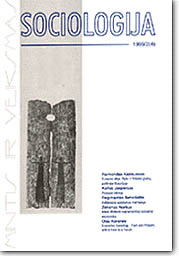Social capital
Socialinis kapitalas: nuo moksliniø tyrimo perspektyvø prie empiriniø pastebëjimø. Gero valdymo klausimas
Author(s): Irmina MatonytėSubject(s): Social Sciences
Published by: Vilniaus Universiteto Leidykla
Keywords: socialinis kapitalas; pasitikėjimas; nevyriausybinės organizacijos; visuomeninė veikla; valdžia; vietos valdžia; geras valdymas. Social capital in Kaunas and Kaunas region; political sociology
Summary/Abstract: Social capital is a term, which is widely used in social sciences today. The concept has been coined by the French philosopher and sociologist Pierre Bourdieu and popularized by the American political scientist Robert Putnam. However, the two authors talk of rather different phenomena while using the same term; they assign different importance (cause-effect) to different components and events of the social life; they draw rather dissimilar recommendations concerning actions of the public authorities and individuals. In this text the two theories are outlined, then some data from the survey “Social capital in Kaunas and Kaunas region” conducted in spring 2003 are presented and interpreted. The interpretation does not allow much hope that the social capital understood as participation in social activities and voluntary organizations might in some automatic (miraculous) way – without changing power relations and increasing material well being of the majority of social groups – lead to enhanced citizenship and community development. Active and responsible role of the municipalities (local authorities) might be one of the actual leverages to encourage and improve development of civil society (non-governmental organizations). Sociological research shows that the social capital in a constructive way shall be understood as dependent variable, which might be positively influenced (affected) by the “good” governance.
Journal: Sociologija. Mintis ir Veiksmas
- Issue Year: 2004
- Issue No: 01
- Page Range: 022-037
- Page Count: 16
- Language: Lithuanian

